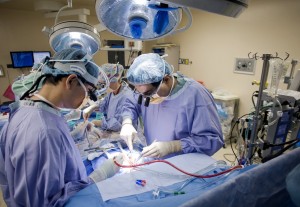What Is A Cardiothoracic Surgery Physician Assistant?
 As the name implies, the cardiothoracic surgery PA is a skilled physician assistant who has chosen to specialize in this particular medical field, and who is trained to assist licensed cardiothoracic surgeons during operations that involve the heart, the lungs as well as the chest walls. Cardiothoracic surgery can often make the difference between life and death, and it becomes an aspect of utmost importance for the treatment of lung cancer, leaking heart valves as well as various blockages that occur in the heart vessels. This is where the cardiothoracic surgery PA steps in and helps the surgeon complete this medical procedure, one that is often extremely stressful and demanding.
As the name implies, the cardiothoracic surgery PA is a skilled physician assistant who has chosen to specialize in this particular medical field, and who is trained to assist licensed cardiothoracic surgeons during operations that involve the heart, the lungs as well as the chest walls. Cardiothoracic surgery can often make the difference between life and death, and it becomes an aspect of utmost importance for the treatment of lung cancer, leaking heart valves as well as various blockages that occur in the heart vessels. This is where the cardiothoracic surgery PA steps in and helps the surgeon complete this medical procedure, one that is often extremely stressful and demanding.
The exact duties and requirements of a cardiothoracic surgeon PA may vary, but these health care professionals are required to insert chest tubes, to drain fluid from the lungs, to place V lines in the veins or arteries of the patient, to administer medications and so on.
How To Become A Cardiothoracic Surgery PA?
The path one needs to take in order to become a physician assistant who specializes in cardiothoracic surgery is relatively simple and straightforward, and the first step you will have to take is to complete a physician assistant training program that is ARC-PA accredited. Some of these programs require you to have an Associate’s degree in order to be accepted, while others only require a Bachelor’s Degree. In addition to this, other eligibility requirements may also include undergrad classes in chemistry, biology as well as anatomy, and most of the universities that offer accredited and trustworthy PA training programs also require their applicants to have some degree of experience in the medical field, experience that is often achieved by working either as a nurse or as a paramedic.

The average length of the physician assistant training program is of 24 months, and the curriculum includes in-depth classes in some of the most important topics for every future physician assistant, such as medical ethics, biochemistry, anatomy, pharmacology as well as biology. At the end of the training program, every physician assistant must pursue his or her certification in order to be able to work legally in the field, and the only way to do that is by passing the PANCE examination. After becoming certified and state licensed, physician assistants can choose to either start working under the supervision of a licensed physician, or to take their training and expertise to the next level by pursuing a CAQ, or a Certificate of Added Credentials. If you have decided to become a cardiothoracic surgery PA, then you will need to look for a postgraduate residency program that will involve a certain number of clinical hours in this medical field – generally, up to 2000 hours of supervised clinical experience. These programs usually last between 12 and 18 months, and they will give you all the insight, skills and knowledge in the cardiothoracic surgery that you will need later on.
Regarding the physician assistant post graduate residency program in cardiothoracic surgery, it must be said that the didactic curriculum usually includes a combination of Internet-based training programs, conferences as well as live lectures, along with topic courses in thoracic surgery, critical care management, analysis of the advanced surgical techniques used for the treatment of coronary atherosclerosis, cardiovascular physiology, cardiac valvular disease treatment as well as the treatment of thoracic aortic diseases and the surgical treatment of heart failure. Even though it is the licensed cardiothoracic surgeon who performs most part of the surgery, it is crucial for the physician assistant who assists him in surgery to have some basic knowledge related to the operating room as well.
In addition to the didactic curriculum which will provide you with all the theoretical knowledge, the postgraduate residency programs in cardiothoracic surgery also include a clinical curriculum which involves clinical rotations, where the physician assistant residents are gradually exposed to different cardiothoracic surgery procedures, such as mitral valve repairs, thoracic aortic replacement, heart transplants, coronary artery bypass, congenital heart surgery and others. Only after completing the residency program students can move on to pursuing their CAQ credentials, and then they can start looking for a job in a public hospital or a private clinic where they can enjoy this very lucrative and rewarding medical career.


I want to do course of cardiothorasis surgeon’s assistance
can any body suggest me what to do?
you such follow your dreams